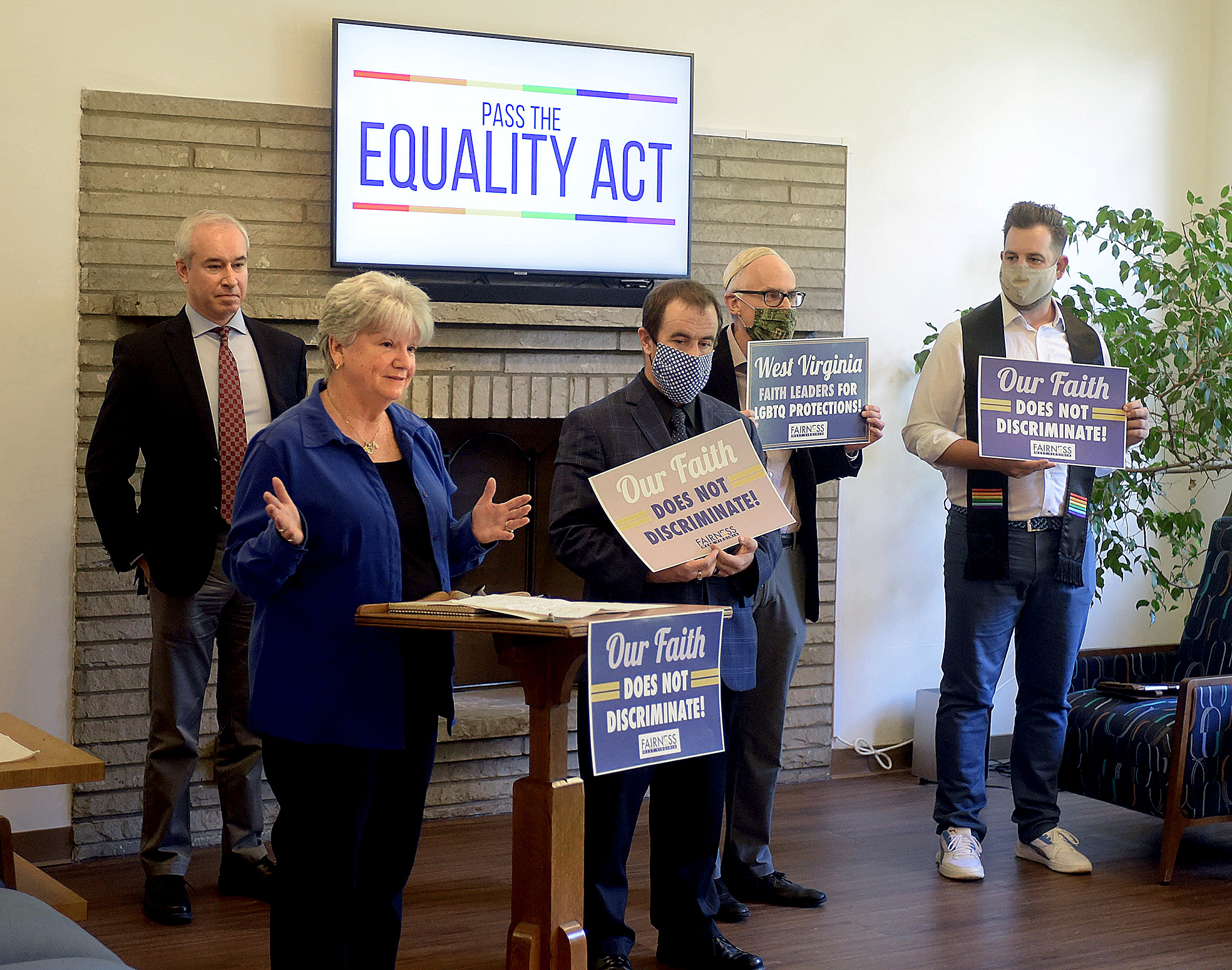MORGANTOWN — Area faith leaders met on Wednesday at First Presbyterian Church to express their support of the Equality Act and urge state representatives to advocate for the protection of LGBTQ+ individuals from discrimination.
The Equality Act is a piece of federal legislation that seeks to modernize and improve United States civil rights laws with explicit, permanent protections for LGBTQ+ individuals, women, people of color and people of all faiths.
Over 100 faith leaders representing more than 30 cities across the state have voiced their support of the act and have signed an open letter endorsing LGBTQ+ nondiscrimination protections and detailing why state representatives need to support its passage.
“LGBTQ people are our friends, neighbors, family and coworkers. We are all God’s children and we all deserve to go about our daily lives without the fear of discrimination. Despite our diversity of faith traditions and backgrounds, we share the fundamental belief that we are all called to treat others with the respect we desire for ourselves,” the faith leaders wrote.
Andrew Schneider, executive director of Fairness West Virginia, was the first to speak at Wednesday’s forum. He said West Virginia is one of 29 states that lack fundamental protections for LGBTQ+ people. As a result, LGBTQ+ people can still be denied housing and healthcare in the state.
There are 14 municipalities in West Virginia that have instituted such protections, but those places only make up about 12.8% of West Virginia’s total population.
“That needs to change,” Schneider said.
He said such protections are compatible with religion and evidenced that by introducing the faith leaders in attendance, who voiced enthusiastic and impassioned support of the Equality Act.
Zac Morton, pastor at First Presbyterian Church, said the time has come to pass this piece of legislation.
He said no one deserves to experience discrimination, and members of LGBTQ+ community especially have been targeted for being who they are. He said enacting this legislation would demonstrate to LGBTQ+ individuals that they belong and that they are not second-class citizens.
Because of his faith, Morton sees the importance of LGBTQ+ nondiscrimination protections from another angle.
Above all else, Morton’s faith has taught him that God is love.
God and Jesus Christ promoted hospitality, generosity and loving thy neighbor, he explained. Morton said the Equality Act embodies all of those ideas.
“We can only be human when we are human together,” he said.
Rev. Valerie Gittings of Fairmont’s First Baptist Church said that hope is rooted in the belief of human rights for all, which is further rooted in scripture.
In the past, scripture has been used to excuse slavery, the oppression of women and the rejection of divorce — but this isn’t what Jesus was about, Gittings said.
“Scripture has not changed, but our understanding of it has,” she said.
She said life is already difficult; we should focus on removing barriers that make it even harder for LGBTQ+ people. Passing the Equality Act would be taking another step toward liberty and justice for all.
Joseph Hample, rabbi at Tree of Life Congregation, said we are all reflections of God. He recounted the scriptural story of Miriam, who led the Hebrew women in dancing, singing and playing drums. Miriam was never referred to as a wife or a mother. When Miriam died, the wells in the desert dried up. People spent years there without water.
According to Hample, LGBTQ+ individuals have spent more than 40 years in a “desert of oppression.”
He named many figures — Debbie Friedman, Billie Jean King, Mary C. Morgan and Randy Schilts — who, despite their influential nature, could still be denied housing and healthcare in the state of West Virginia today.
Forty years ago, in 1981, no one could have anticipated the legalization of same-sex marriage or having publicly LGBTQ+ lawyers, judges, politicians and journalists, he said. No one could have anticipated that there would be continued exclusion of the LGBTQ+ community 29 states, either.
“I believe every human being has infinite worth; to disrespect anyone is an insult to our maker,” Hample said.
Bob Roberts, pastor at Morgantown’s First Christian Church, Disciples of Christ, understands scripture to be fully inclusive of the LGBTQ+ community. He said employment discrimination was legal in the state of West Virginia until just last year, and housing discrimination is still legal.
“That is just not okay,” he said.
Roberts confessed that his sister recently relocated from West Virginia to California due to her LGBTQ+ identity, and that was heartbreaking for him.
All faith leaders made a point to address Sens. Joe Manchin and Shelley Moore Capito, asking them to show support for the Equality Act to help it pass and provide federal nondiscrimination protections to the LGBTQ+ community and other marginalized groups.
These faith leaders joined the majority of Americans, hundreds of members of Congress and more than 600 organizations — including civil rights, education, healthcare and faith-based organizations — in endorsing the Equality Act. More than 400 U.S. businesses and more than 60 business associations have also publicly supported the legislation.
Almost two-thirds of LGBTQ+ individuals have reported experiencing some form of discrimination. The Equality Act would guarantee that members of the LGBTQ+ community are extended the same federal anti-discrimination protections that others in the United States have been afforded.
The act would also protect millions of women who are not covered under some existing federal anti-discrimination laws and expand the public spaces and services that cannot discriminate against anyone based on race, national origin or religion.
TWEET @DominionPostWV




